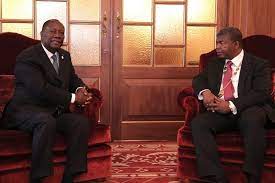The Angolan President Joao Manuel Lourenco, is paying an official visit to Cote d’Ivoire, which is aimed at intensifying bilateral cooperation by increasing and diversifying trade and holding regular consultations on issues of common interest.
The Angolan President arrived in Abidjan on Wednesday, June 26, 2024 and he will hold talks with his Ivorian counterpart, Alassane Ouattara. This visit by the Angolan President would help to strengthen relations, especially on the memorandum of understanding signed by the two countries on the production, refining and marketing of hydrocarbons.
Although Côte d’Ivoire produces oil, it obtains its energy needs on the international market. On February 15, 2002, the two countries signed an agreement for the marketing and refining of hydrocarbons between SONANGOLEP and PETROCI. On March 20, 2023 in Abidjan, the two countries signed an agreement on reciprocal exemption from entry visas for holders of diplomatic or service passports and on February 20, 2018, in Luanda, they initialed a memorandum of understanding on the negotiation of the aviation agreement.
An agreement was also signed in Abidjan on June 12, 2001 to set up the Ivorian-Angolan Joint Commission to discuss the challenges facing their relations.
This platform enables them to fine-tune their points of view on various subjects. The level of trade between Côte d’Ivoire and Angola is still low and has not changed significantly, despite the enormous economic potential of these two oil-producing coastal countries.
Total trade was about 28.04 billion CFA francs in 2022, compared with 16.112 billion CFA francs in 2021, an increase of 11.928 billion CFA francs, while Côte d’Ivoire will have a trade deficit of -2.974 billion CFA francs in 2022. Côte d’Ivoire’s exports to Angola include bitumen, green coffee, cotton, rubber, fishing products and various other products. The two parties will discuss issues relating to agriculture, culture, health, security and tourism. The main products imported by Côte d’Ivoire from Angola include bottles, gas cylinders, liquefied butane, food products and various consumer goods.
AP/fss/GIK/APA


